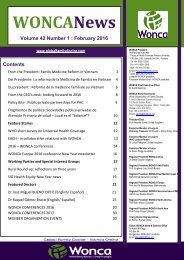Create successful ePaper yourself
Turn your PDF publications into a flip-book with our unique Google optimized e-Paper software.
STRESSED OR MISERABLE Patient• Assess the patient with suicidal thoughts 49.Recognise the stressed/miserable patient needing urgent attentionAssess the stressed/miserable patient• The patient may have headache, dizziness, fatigue, abdominal pain. S/he may have poor eye contact, cry easily, be agitated or communicate poorly.Screen for mental problem• If low mood or sadness, loss of interest or pleasure, feeling tense, worrying a lot or not coping as well as before, consider depression/anxiety 81.• If > 21 drinks/week (man) or > 14 drinks/week (woman) and/or > 5 drinks/session or misuses illicit or prescription drugs consider substance abuse 83.• If hallucinations, delusions and abnormal behaviour, consider psychosis 84.• If memory problems, screen for dementia 86.Identify the traumatised/abused patient• Ask ‘Are you unhappy in your relationship? Has anything happened to you which changed your life?’ If yes to either 53.Try to identify a cause to focus on a solution• Ask about financial difficulty, bereavement, post-natal 97, menopause 98 or chronic ill-health (is HIV status known? 60).• Review medication: oral corticosteroids, oestrogen-containing oral contraceptives ( 91), theophylline, efavirenz can cause mental side effects. Reassure patient on efavirenz that low mood isusually self-limiting and resolves within 6 weeks on ART. If > 6 weeks doctor to change to NVP 200mg 12 hourly.Advise the stressed/miserable patient• Encourage patient to take time to relax:--Do a relaxing breathing exercise each day.--Find a creative or fun activity to do.--Spend time with supportive friends or family.• Regular exercise might help.• Advise patient to get adequate sleep. If patient has difficulty sleeping 54.• Link patient to available psychosocial services: counsellor, psychologist, support group, social worker, helpline back page.• Deal with negative thinking--The patient may often predict the worst, generalise, exaggerate the problem, inappropriately take the blame, or take things personally.--Encourage the patient to question his/her way of thinking (like changing ‘I am a failure’ to ‘I am not a failure, I have achieved many good things in the past’), examine the facts realisticallyand look for strategies to get help and cope.• See communicating effectively see Preface.Offer to review the patient in 1 month.52TB HIV CHRONIC RESPIRATORYDISEASECHRONIC DISEASESOF LIFESTYLEMENTAL HEALTH EPILEPSY MUSCULOSKELETALDISORDERSWOMEN'S HEALTH



